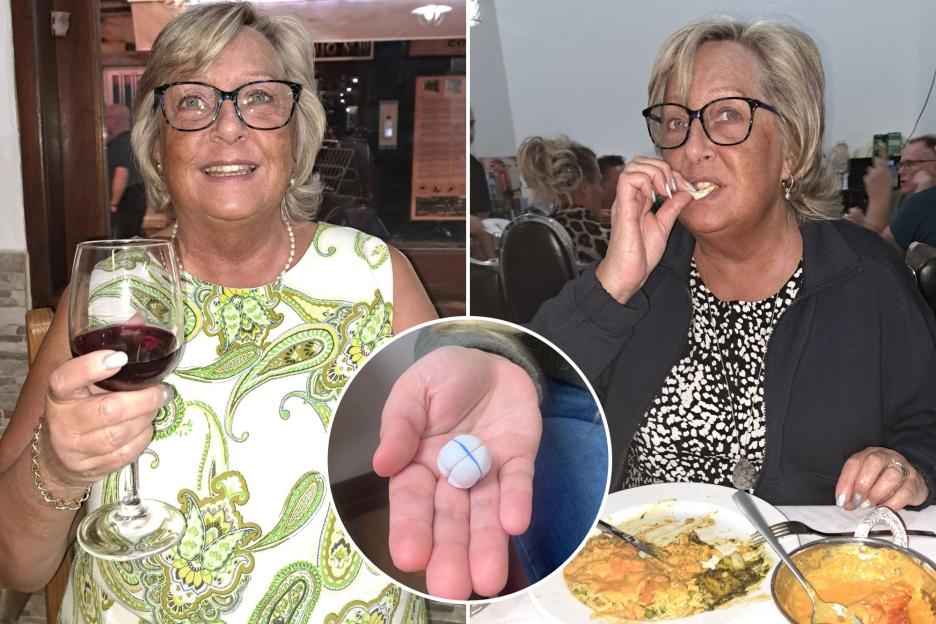WEIGHT-LOSS drugs can be a silver bullet for some trying to shed the pounds after years of failure with fad diets and exercise routines.
But dodgy vendors selling potentially deadly fake jabs laced with everything from rat poison to cement have appeared on the black market – with murky labs in foreign countries fuelling the supply, experts have told The Sun.
 Bags of fake Ozempic pens seized in a UK crackdown
Bags of fake Ozempic pens seized in a UK crackdown
 Michelle Sword fell into a coma after using fake fat jabs – which turned out to be insulin
Michelle Sword fell into a coma after using fake fat jabs – which turned out to be insulin
 Aisleyne Horgan-Wallace thought she’d bagged herself a bargain after buying fat jabs through a WhatsApp group – but says she ‘nearly died’
Aisleyne Horgan-Wallace thought she’d bagged herself a bargain after buying fat jabs through a WhatsApp group – but says she ‘nearly died’
 Wegovy and Mounjaro are the licensed weight loss jabs in the UK
Wegovy and Mounjaro are the licensed weight loss jabs in the UK
Celeb endorsements and gushing influencers have encouraged many people who can’t get fat jabs prescribed by the NHS to look for Wegovy, Ozempic , and Mounjaro elsewhere.
And some Brits have found out the hard way about the perils of gambling with fake drugs – which can contain a cocktail of poison, including cement and arsenic.
One of those was Celeb Big Brother star Aisleyne Horgan-Wallace , who told The Sun she “thought she was going to die” and even lost her eyesight after unknowingly taking fake weight-loss jabs.
She was left bedridden for three days, constantly vomiting and was unable to even walk to her en-suite toilet after injecting what she dubbed a “syringe of horror”.
Her crystal clear message to anyone thinking about buying weight-loss jabs from an unofficial source is: “Don’t.”
So-called “skinny jabs” require a prescription from a qualified medic – and must be obtained from registered pharmacies.
Ozempic is only licensed as a type 2 diabetes treatment in the UK, unlike in America, meaning the NHS cannot prescribe it for weight loss.
Private doctors may be willing to prescribe it “off-label” for weight loss – but that exposes people to a higher risk of being duped, experts say.
Meanwhile, Wegovy and Mounjaro can be prescribed on the NHS for weight loss – and may also be bought privately.
Crucially, private purchases also need a prescription from a qualified medic – and online platforms are required to conduct a face-to-face or video consultation before dispensing the drugs.
But in reality, jabs can be bought without prescriptions – widely available from social media or unlicensed websites posing as pharmacies flogging the stuff for less than half price at around £80.
‘Dicing with death’
Health chiefs warned last year that deadly fakes had reached the UK market – and broken into the legitimate supply chain.
So far, over 100 deaths have been linked to weight loss drugs in the UK, according to recent data , and it’s unclear if any deaths have been linked to fake jabs.
But a leading GP who spoke to the BBC warned that those buying weight loss drugs online are “dicing with death”.
Counterfeits are often linked to organised crime groups, according to Anne Devaud, the head of product security at Novo Nordisk – the manufacturer of Ozempic and Wegovy.
Anne told The Sun: “There are lots of sellers in Turkey using UK or French phone numbers to hide where the supply is really coming from.
“The best way for these criminals to flog their wares is through social media – because that’s where Brits naturally turn,” she added.
I can’t believe that I allowed my insecurities to almost kill me
Michelle SwordBought fake Ozempic
Groups in China are one of the primary sources for the fakes, Anne said, but the company has also identified counterfeit manufacturing in places like Turkey and Brazil .
Anne said: “There are different sources of illicit manufacturing.
“Some may order semaglutide from, for example, a Chinese supplier and then do their own stuff.
“But another group might simply put starch or water inside – because the purpose is solely to make money.”
Real Ozempic and Wegovy jabs contain the active ingredient semaglutide, while Mounjaro uses a compound of the same chemical with another called tirzepatide.
But fake pens can contain dangerously high doses of semaglutide, or different drugs entirely, like insulin, which can make people seriously sick if taken unnecessarily.
Some online platforms also sell real products which have been shipped from overseas, where the same rigorous standards don’t apply.
Experts say that the rise of counterfeit drugs is a consequence of the supply struggling to keep up with demand – and imposter jabs present a range of perils.
 Mum-of-two Michelle Sword managed to get hold of the fake jabs without any medical checks, and was told it could be delivered straight away
Mum-of-two Michelle Sword managed to get hold of the fake jabs without any medical checks, and was told it could be delivered straight away
 Michelle said, ‘I can’t believe that I allowed my insecurities to almost kill me’
Michelle said, ‘I can’t believe that I allowed my insecurities to almost kill me’
 An original Ozempic pen, top, vs a counterfeit, bottom
An original Ozempic pen, top, vs a counterfeit, bottom
 Counterfeit semaglutide and Ozempic jabs seized in the US
Counterfeit semaglutide and Ozempic jabs seized in the US
Toby Nicol, CEO at CheqUp, told The Sun: “The surge in popularity of weight loss injections has unfortunately created a lucrative opportunity for counterfeiters.
“Fake weight loss drugs often originate from unregulated manufacturing operations, where oversight is minimal and quality control can be nonexistent – they are only interested in cash, not care.
“These counterfeit products frequently enter the market through unauthorised online pharmacies or social media marketplaces that bypass regulation and rules.
If it seems too good to be true, it probably is
Toby Nicol CEO at CheqUp
“They come in one of two forms – either in pens which mimic those offered genuinely for Mounjaro and Wegovy or sold simply as some powder in a vial to which people add water.
“This latter type is very common on TikTok where patients are encouraged to buy something, which could be chalk and inject it into themselves.
“Anything which costs less than about £80 to £100 per month is probably fake.”
Toby warned: “If it seems too good to be true, it probably is.”
Rat poison, cement and arsenic
Kevin Joshua, a weight-loss clinician, explained how the fakes sometimes contain insulin instead of semaglutide – which can lead to “critically low blood sugar, coma, or death”.
People with diabetes take insulin to top up their natural levels, so that they are able to break down sugar properly.
Taking too much insulin or injecting when you don’t need it can lead to disorientation, seizures or even death.
He added: “Chemical analysis of fake weight loss injections has also identified contaminants like rat poison, arsenic, cement, mercury, bacteria or viruses that may result in sepsis , infection, or organ failure.”
Dr Tim Mackay, a professor at the University of California , San Diego, who studies counterfeit medications, told us that some criminal enterprises get their hands on “research-grade” drugs, not meant for human consumption, and pass it off as the real thing.
Other fakes will contain impure semaglutide, dangerously high doses or other drugs entirely, he said.
These counterfeit products frequently enter the market through unauthorised online pharmacies or social media marketplaces that bypass regulation and rules
Toby NicolCEO at CheqUp
Jason Murphy, Head of Pharmacy and weight loss injection expert at Chemist4U, said: “It really depends on what’s in them.
“And that’s part of the problem, you just don’t know. Some might have no active ingredients at all so they just don’t work.
“Others might contain the wrong dose or harmful substances that can cause stomach issues, blood pressure problems or worse.
“There’s also a real risk when it comes to sterility.
“If the product hasn’t been made in clean conditions, there’s a chance it could be contaminated, which can lead to infections or serious health complications.
“Because these fake drugs haven’t gone through proper safety checks, every dose is a gamble.”
‘I came so close to death’
Big Brother star Aisleyne Horgan-Wallace says she almost died and lost her eyesight after taking fake Ozempic last year.
She tells The Sun that last year was “really tough” after she lost two very important people and her way of dealing with the pain was to “eat her feelings” – meaning she piled on almost two stone.
When a friend suggested she tried Ozempic, Aisleyne rushed into it without considering the dangers, because she was in “such a bad place”.
She says: “I got added to a WhatsApp group where girls talk about what they want to have done – lip fillers and things – and someone on there was offering Ozempic.
 Aisleyne Horgan Wallace says she ‘nearly died’ after injecting fake fat jabs
Aisleyne Horgan Wallace says she ‘nearly died’ after injecting fake fat jabs
 Texts between Aisleyne and the person who organised her supply, about another friend who fell sick after using the injections
Texts between Aisleyne and the person who organised her supply, about another friend who fell sick after using the injections
 Aisleyne’s drugs came in an unbranded syringe
Aisleyne’s drugs came in an unbranded syringe How to spot a fake
MOST fakes are not completely identical to the authentic products, and there are some signs you can look out.
According to Novo Nordisk, the manufacturer of Ozempic and Wegovy, these are the giveaways…
- Dodgy packaging: Fake jabs will often come in boxes and packaging of inferior quality. The graphics are more likely to look cheap or misaligned.
- Spelling errors: Text on the counterfeits are much more likely to contain spelling mistakes.
- Dose selector: The manufacturer says that some fakes have dose selectors which can be pulled out when dialled to a select dose. The selectors on the genuine product are fixed in place.
- Unbranded: Some counterfeits are completely unbranded, like the plain syringe Aisleyne received. The genuine products will always be branded with the company name and logo.
However, it’s important remember that some counterfeits will not bear any of those signs. The only way to guarantee a genuine product is to “obtain appropriate medicine on prescription through legitimate sources”, Novo Nordisk advises.
“With the first month’s supply I felt fine, even energetic, and I could see that I was losing a bit of weight.
“But then I took the second month’s – and I came so close to death. I wish I never, ever took the first month’s supply or even heard about this drug.
“For three days I was in bed, literally comatose. I’d wake up, roll over and vomit into a bag. There were bags of vomit all around me.
“I couldn’t even walk the two steps to the en-suite toilet, I had to crawl and drag myself.
“After a day I didn’t need to go to the toilet because I wasn’t eating or drinking – I couldn’t even sip anything.
“On day two, I opened my eyes and I couldn’t see anything out of one of my eyes.”
The TV star to this day does not know what was in the jabs – but insists: “It was a syringe of horrors, that’s all I know. The chemicals must have been wrong.”
 Wegovy is the UK version of Ozempic licensed for weight loss in the UK
Wegovy is the UK version of Ozempic licensed for weight loss in the UK
 Amy Schumer is one of the many high-profile celebs to admit she has used weight loss drugs
Amy Schumer is one of the many high-profile celebs to admit she has used weight loss drugs
 Gemma Collins also revealed she has been using fat jabs
Gemma Collins also revealed she has been using fat jabs
Many other women have got in touch with Aisleyne with similar accounts, proving the problem is widespread.
Michelle Sword, 47, is another who nearly died after injecting herself with a fake Ozempic jab.
She fell into a coma after administering the medicine, which turned out to be insulin.
Michele said: “It was a lot harder to get hold of Ozempic, so I didn’t go down the conventional way of doing it.
“The beauty companies and the online aesthetic companies all seemed to have it.”
The mum-of-two managed to get hold of some without any medical checks, and was told it could be delivered straight away.
But soon after injecting, she collapsed and began suffering seizures – and tests showed her blood sugar levels had plummeted and sent her into a diabetic coma.
Michelle said: “I can’t believe that I allowed my insecurities to almost kill me.”
Fat jab crisis
In December 2024, the Royal Pharmaceutical Society warned that social media was fuelling such an appetite for weight-loss jabs that the supply simply couldn’t keep up.
It even likened the situation to the toilet paper shortages during the Covid pandemic .
To keep up with demand, some NHS pharmacies could soon be given powers to prescribe the injections – cutting out the need for patients to see the GP.
Addressing the unlicensed supply chain, it said: “These unregulated websites often specifically target those medicines that are in shortage.
“These illegal sites come with the risk that patients may be accessing medicines that are outside of a rigorous, quality-controlled supply chain and may be unauthorised and/or falsified.”
Similarly, the National Pharmacy Association warned there could be a possible “explosion in the unlicensed sale of medication online”.
NPA chairman Nick Kaye said last year: “Pharmacists remain deeply concerned that the current medicine shortages crisis could lead to an explosion in the unlicensed sale of medication online.
“Stocks of Ozempic are very depleted in community pharmacy in the UK and it is important that these remain prioritised for those in the most clinical need.
“Given the precarious state of supply of this and other vital medication, there is a much greater risk of people looking to order in supplies from disreputable online vendors.”
 Even if the product is branded as Ozempic it can be a fake – like this suspected counterfeit
Even if the product is branded as Ozempic it can be a fake – like this suspected counterfeit
 The drugs can be injected into the skin of your stomach, thigh or arm
The drugs can be injected into the skin of your stomach, thigh or arm
Cracking down
Novo Nordisk is the pharmaceutical company which manufactures Ozempic and Wegovy.
Anne, head of product security, told The Sun that pharma companies are collaborating with each other and law enforcement agencies to counter the rise of counterfeit products.
She said: “It’s a long run, because we are fighting against organized crime. But I’m confident because now we have governance, we are sharing with other pharma companies and authorities.
“The best ways to mitigate against the risks are two things: First is to litigate as much as possible and work with prosecutor in order to disrupt [the supply].
“The second is to continue to develop awareness – because everybody has a responsibility.
“If patients are more vigilant, ordering less online, if we are collaborating with authorities, if also authorities are reinforcing regulation to avoid any illicit compounding to enter in the country, I’m quite confident that with this combined effort we may really make a difference, so there is no question mark for us. We are on it.”
Novo Nordisk urges anyone who believes they have hold of a fake pen to not use it.
They are encouraged to report it to the Medicines and Healthcare Products Regulatory Agency – the body tasked with protecting the UK’s drug supply.
The MHRA said it has been seizing counterfeit Ozempic pens since 2023.
Andy Morling, its deputy director of criminal enforcement, told CNBC last year: “We saw that the demand increased and quite often as it happens in these situations, criminals try and fill a gap where the supply and demand aren’t balanced for a particular product, and we started seeing real counterfeit versions of the Ozempic product on the market.”
Everything you need to know about fat jabs
Weight loss jabs are all the rage as studies and patient stories reveal they help people shed flab at almost unbelievable rates, as well as appearing to reduce the risk of serious diseases.
Wegovy – a modified version of type 2 diabetes drug Ozempic – and Mounjaro are the leading weight loss injections used in the UK.
Wegovy, real name semaglutide, has been used on the NHS for years while Mounjaro (tirzepatide) is a newer and more powerful addition to the market.
Mounjaro accounts for most private prescriptions for weight loss and is set to join Wegovy as an NHS staple this year.
How do they work?
The jabs work by suppressing your appetite, making you eat less so your body burns fat for energy instead and you lose weight.
They do this my mimicking a hormone called GLP-1, which signals to the brain when the stomach is full, so the drugs are officially called GLP-1 receptor agonists.
They slow down digestion and increase insulin production, lowering blood sugar, which is why they were first developed to treat type 2 diabetes in which patients’ sugar levels are too high.
Can I get them?
NHS prescriptions of weight loss drugs, mainly Wegovy and an older version called Saxenda (chemical name liraglutide), are controlled through specialist weight loss clinics.
Typically a patient will have to have a body mass index (BMI) of 30 or higher, classifying them as medically obese, and also have a weight-related health condition such as high blood pressure.
GPs generally do not prescribe the drugs for weight loss.
Private prescribers offer the jabs, most commonly Mounjaro, to anyone who is obese (BMI of 30+) or overweight (BMI 25-30) with a weight-related health risk.
Private pharmacies have been rapped for handing them out too easily and video calls or face-to-face appointments are now mandatory to check a patient is being truthful about their size and health.
Are there any risks?
Yes – side effects are common but most are relatively mild.
Around half of people taking the drug experience gut issues, including sickness, bloating, acid reflux, constipation and diarrhoea.
Dr Sarah Jarvis, GP and clinical consultant at patient.info, said: “One of the more uncommon side effects is severe acute pancreatitis, which is extremely painful and happens to one in 500 people.”
Other uncommon side effects include altered taste, kidney problems, allergic reactions, gallbladder problems and hypoglycemia.
Evidence has so far been inconclusive about whether the injections are damaging to patients’ mental health.
Figures obtained by The Sun show that, up to January 2025, 85 patient deaths in the UK were suspected to be linked to the medicines.







